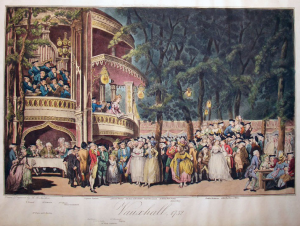Choose one of the following topics as a prompt when constructing your thesis. It is important for your essay to have both a thesis and specific evidence from the literature to support that thesis. Remember: saying that there are “similarities and differences” does not a thesis make. When comparing two or more things we can always find shared elements as well as disparate elements. In your thesis you need to specifically identify the grounds of your argument. Think of a thesis as the first step in proving your particular reading of a piece of literature.
The topics below are just that: topics. You will find an array of suggestions rather than prescribed questions. Furthermore, I have specified no texts. You will eventually “customize” the topic as you form your thesis. You need not feel compelled to answer all of these questions in your essay, and you should certainly also engage with questions of your own.
Guidelines: In responding to these prompts, you may choose to focus on one text but no more than two in detail. When appropriate, however, you may support your argument by drawing briefly on other texts. Indeed, this is a way to enrich and strengthen your argument.
- Many of the works that we have read this semester either explicitly or implicitly represent an “ideal” eighteenth-century woman. Quite often that ideal’s virtues and failings are revealed through implicit and explicit comparison with other female characters and types, through both foils (female characters distinctly different from the ideal) and doubles (characters eerily both like and unlike the ideal). In your essay, construct an argument around the function of foils and/or doubles in texts intent upon representing the “ideal” eighteenth-century woman. In responding to this prompt, you’ll also want to consider the ways in which this ideal corresponds, contradicts, or complicates mainstream cultural norm.
- This prompt is the gendered double of the one above: the texts that we’ve read this semester have tended to focus upon the representation of feminine identity and subjectivity but they have also addressed questions of masculinity, male power, and the “education” of male figures. Based upon the texts that we’ve read this semester, who is the ideal “eighteenth-century man” and what are his attributes? Again, you’ll want to explore the ways in which this ideal corresponds, contradicts, or complicates mainstream cultural norms.
- All of the texts that we’ve read this semester are carefully crafted literary constructions. This prompt asks you to focus on the significance of rhetorical and literary techniques when crafting your thesis about the text. For example, you might consider
-
- the ways in which the “letter” functions in Montagu’s The Turkish Embassy Letters or Burney’s Evelina
- the use of neoclassical literary conventions in the poetry of Phillis Wheatley
- the use of satire by Jane Collier
- the cultivation of a distinction between author and speaking subject (or narrator) of a text
- Many of the texts that we’ve read this semester argue that education is the most crucial aspect of a young woman’s successful “entrance into the world.” However, there is not necessarily agreement about what constitutes the “best” education and its successful conclusion. This writing prompt asks you to consider the import of different educational models in the period and explore some of its complex debates, so it will require you to write on two different texts. You may structure this as you want but here are some things to consider:
- the value of retirement and sheltering protection over entering the world as an independent — although possibly unprotected — agent
- “veiling” (both literally and metaphorically) versus explicit revelations of the self, which can be related to displaying versus hiding knowledge, feeling, and/or desire the significance of form to representations of education
- what difference is made when a call for educational reform appears explicitly in a non-fiction essay or poem versus implicitly in a novel or poem?
- Consider the ways in which the cultural institutions of eighteenth-century culture in regards to law, sexuality, race, and class can complicate even the most progressive vision of improved conditions for women in the eighteenth century. There are many different ways to approach this question. For example, you might consider the ways in which Lady Mary Wortley Montagu’s class-based biases inflect her critique of British culture OR you might consider the ways in Phillis Wheatley employs her personal experience as an enslaved person in a poetry that carefully critiques political and religious hypocrisy OR the way in which Evelina both critiques and yet conforms to eighteenth-century marriage conventions, particularly in regards to economics, sexual reputation, and female agency.
- You may draw upon your in-class presentation to craft an essay that considers the subject of that presentation in relation to one of the works read this semester. Since this is a critical interpretive essay, biographical detail should be avoided. In other words, you need to focus on the significance of your figure’s presence in culture, be it her literary or cultural contribution, and consider that significance in relation to one of the assigned texts.
Paper Length: 5-7 pages
Please follow MLA guidelines from the MLA Handbook. If you don’t have an MLA Handbook, you should probably purchase one. The Purdue Owl website has been updated, however, and may be sufficient.
Refer to Writing Presentation 2019 for guidelines and expectations
Please turn all essays in electronically (google doc link or .doc to roxanne.eberle@gmail.com)
I will be happy to read thesis statements/paragraphs if you submit them to me by Monday, October 14th.
Essay due by Friday, October 25th at 9:00pm
